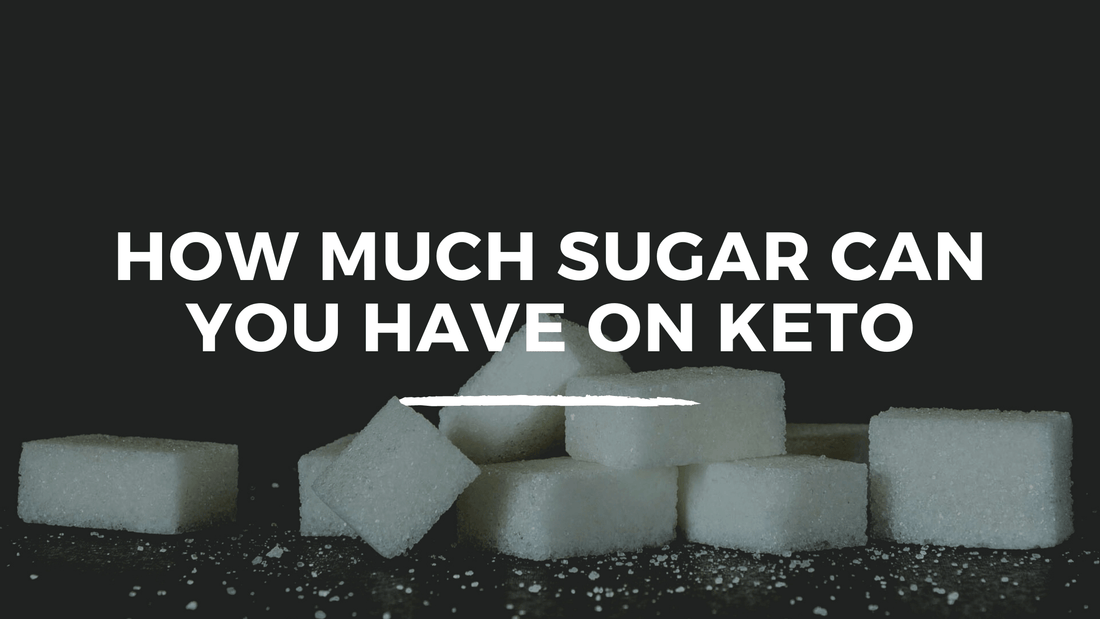
How much sugar can you have on Keto
Aria PalcichShare

By this point, we assume that you are more than familiar with the keto diet. The super-low-carb, moderate-protein, and high-fat diet has helped a lot of people to boost their energy levels, drop weight, and ultimately, transform their lifestyles. However, as popular and wide-reaching as this diet is, there are still plenty of myths and misconceptions about it.
To begin with, there are a lot of people that think carbs are completely banished on this diet and you cannot eat them at all in order to get into the state of ketosis, i.e. your body’s fat-burning state. However, this could not be further from the truth! Carbs are allowed, although they are limited, typically around 50 grams or less per day.
So, what about sugar? A lot of Keto diets make the switch to stevia and other calorie-free sweeteners. But is this the best thing to do? Can you have a small amount of sugar instead? In this guide, we will reveal everything you need to know about getting that much-needed dose of sweetness while on the Keto diet.
Understanding exactly what sugar is
When you think of sugar, you probably think of sucrose or white table sugar. However, sugar is actually just a generic name for carbohydrates that have a sweet taste.
Sugars can be classified based on their size. The simplest form of sugars is monosaccharides. They cannot be broken down any further. Galactose, fructose, and glucose are all monosaccharides.
You then have disaccharides, which are created using two different monosaccharides. For example, lactose is a disaccharide, which is made from galactose and glucose. Sucrose, or table sugar, is created using fructose and glucose.
Of course, you do not need to remember all of these technical names! However, it helps to show how sugar comes in many different forms and is hidden in a lot of different products. Whenever you consume lactose-rich products, for instance, you know that there is going to be a high content of sugar, as it is made from galactose and glucose. Whole milk is a prime example here. It is not only high in lactose but it has a high content of sugar as well.
Some of the most common sugars are as follows:
- Malt (malt syrup)
- Molasses
- Invert sugar
- Corn syrup (high fructose corn syrup)
- Agave
- Honey
- Cane sugar
- Maltose
- Sucrose
- Fructose
- Dextrose
Don’t forget: sugar is a carb!
In order to experience all of the amazing health benefits the ketogenic diet provides, you need to make sure that you only consume the number of carbohydrates your body can tolerate in order to stay in a state of nutritional ketosis.
The number of carbs required will differ from person to person. Nevertheless, it is typically lower than 50 grams of carbohydrates every day.
So, when we talk about carbohydrates, we’re referring to every possible source, and refined sugar is included in this.
However, you really should limit your intake of refined sugar as much as possible because it can have an impact on your insulin and blood sugar levels.
Yes, you can still have it, but it really does need to be in moderation, and you need to stay under your daily carb threshold to ensure you remain in a state of ketosis. For some people, their carb threshold can be as low as 20 - 30 grams.
How much sugar can you have on keto?

Generally speaking, keeping your sugar consumption to a minimum is the best choice. In an ideal world, your intake of sugar would be 0 grams per day. However, we know that this is not always possible. So as long as you make sure you stay within your daily carbohydrate limit, you should be fine.
As mentioned, everyone is different, so you may be wondering what limit is going to be right for you. The best way for you to figure out the maximum quantity of sugar and carbohydrates you can have per day is to simply test yourself.
We all have different biochemistry, and so it is impossible to put a strict figure on this for everyone. It is unlikely that you are going to be able to tolerate the exact same number of carbs as the person next to you.
Try consuming different types of foods that have diverse contents of carbs, and then test your blood to determine how both your ketone and glucose levels are impacted.
Of course, your ketones are a direct indicator of being in a metabolic ketosis state. However, the reaction of your blood glucose levels is important too, as this will give you a good insight into your insulin sensitivity and metabolic health.
The benefits of quitting or limiting sugar intake

There are a number of benefits associated with limiting or quitting sugar while following a keto diet.
This can help you to lead a healthier lifestyle, as excessive consumption of sugar has links to a number of different harmful health conditions.
This includes non-alcoholic fatty liver disease, dental cavities and plaque, high cholesterol, high blood pressure, type 3 diabetes, heart disease, metabolic syndrome, obesity, and chronic inflammation.
What will happen if you quit sugar?

If you are on a keto diet and you decide that you are going to give up sugar altogether, your body may experience a period of rebellion, which is known as the carb flu. While it is not exactly fun, it won’t last and it is normal.
Once this has passed and you get used to a diet without any sugar, you will find that those constant cravings for sweets start to drift away until they are pretty much non-existent, which is a great benefit for those who crave sweets all of the time.
The difference between added sugar and naturally occurring sugar
It is important to understand the difference between added sugar and naturally occurring sugar while on a keto diet.
Naturally occurring sugars can be found in the likes of milk products (lactose) and fruit (fructose).
Berries, for instance, are low in sugar and they have a lot of health benefits, for example, manganese, Vitamin K, Vitamin C, fiber, and other micronutrients.
Sugars that occur naturally are not “bad” but you do need to make sure these carbs are taken into consideration when following a keto diet.
Some fruits and vegetables that have naturally occurring sugars that you can still consume on a keto diet are as follows:
In terms of dairy products, they do contain sugar, but it is not necessary to quit them all.
Naturally occurring sugars are found in the likes of cheese, cream, and milk, so it is about making smart decisions.
Let’s take a look at cheese and whole milk so you can get a better understanding:
- Whole milk - Milk does not have any fiber, yet it has 12 grams of carbohydrates, and this is why it is not smart to spend your carbs on whole milk if you are following a keto diet.
- Cheddar cheese - Cheddar is a lot lower in carbs and naturally occurring sugars when compared with whole milk. There are only 0.4 grams of net carbs per one ounce.
As you can see, consuming cheddar cheese can be a smart choice, especially when compared to other dairy options like whole milk.
Watch out for added sugars
What you do need to watch out for, though, is added sugars! Sugar can be found in many different forms and it is added to virtually all processed foods.
Ideally, you are going to need to keep the added sugars very low when following a keto diet. However, you can budget them into your macros per day if you really feel like this is the best way to use your daily amount.
What keto alternatives are there to sugar?
The good news is that there are plenty of amazing sugar-free alternatives. You can replace traditional sugar with something that tastes just as delicious but doesn’t have all of the carbs.
So, once you feel those sugar cravings set in, rather than reaching for those treats, look to use Keto-friendly sweeteners instead.
Stevia, allulose, and monk fruit are three great examples of all-natural sugar substitutes that work perfectly well if you are on a keto diet. They can replace typical table sugar with ease.
You can also use erythritol, which is a sugar alcohol that is acceptable for consumption while on a keto diet.
But should you really use artificial sweeteners on keto?

Now, naturally, we move on to the subject of artificial sweeteners. This can be a bit of a challenging subject.
Some people use artificial sweeteners while on a keto diet, like stevia drops or erythritol, as they only have a very small amount of carbs. Just like you have seen zero carb syrups for pancakes and such like, which can make a lot of appeal because there is a lot of carbs and sugar in pure maple syrup.
Using artificial sweeteners on a keto diet enables you to enjoy keto versions of sweets like pies, cakes, and cookies.
Sounds good, right? It is! However, there are some people who prefer to give up artificial sweeteners, even while they are on the keto diet, so we will present both sides.
While the different sweeteners that are available on the market today are typically considered safe, some people feel like they encourage their sugar cravings. If you quit sugar altogether, you will often lose your sweet tooth and, eventually, you will stop craving sweet things.
However, the brain views artificial sweeteners as “sweet” and this can result in you wanting more of the same thing.
If you have a sensitive stomach, you may find that some artificial sweeteners, like sugar alcohols sorbitol, xylitol, and mannitol can end up causing diarrhea and stomach upset. Of course, this does not happen to everyone, but it can be common in those with sensitive tummies.
Of course, when it comes to replacing sugar with sweeteners, the choice is yours!
Final words on whether or not you can eat sugar will on the keto diet
We hope that this guide has answered all of the questions that you may have about consuming sugar will on the keto diet.
You should certainly make sure you are strict when it comes to limiting the amount of sugar you have per day. After all, sugar is a carb, and you are only allowed a certain amount of carbs daily.
The good news is that there are plenty of great alternatives for those who love to have a cube of sugar in their tea! Try out the different sugar-free options and we are sure you will be able to find one that satisfies your sugar cravings so you do not have to worry about this taking over your daily carb allowance.
